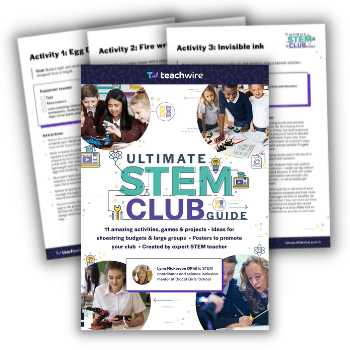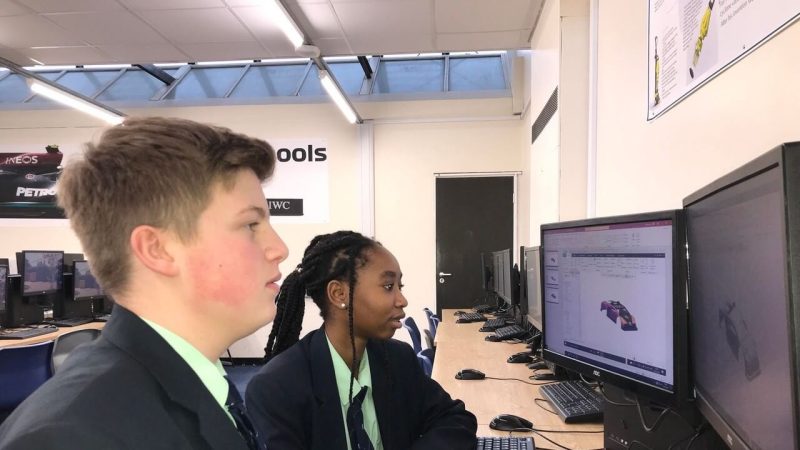Online CPD – improve your science and STEM knowledge with these ideas and courses

Online CPD has rocketed in popularity since lockdown – here’s how to get involved, says Anna Blewett…

- by Anna Blewett
- Freelance journalist

How’s your year going, professionally speaking?
As you grapple with unprecedented disruption in and out of the classroom, it’s tempting to write 2020 off as a bad lot.
And yet, while we all work through the challenges, grappling with our own personal circumstances and handling massively diverse workloads, those who do find themselves with a little more time have a golden opportunity to develop areas of CPD neglected during the frenetic pace of a normal academic year.
In fact, STEM Learning, a not-for-profit organisation that provides STEM education support, has seen demand for its online CPD courses skyrocket amid the lockdown.
‘My gut feeling is teachers who aren’t as busy with work as they would normally be are self-selecting,’ says Tanya Shields, primary STEM lead at STEM Leaning and the National STEM learning centre in York. ‘Science hasn’t really had a profile at primary for a great number of years,’ she explains.
‘It’s only since the new Ofsted framework with a greater emphasis on a broad and balanced curriculum that schools are really beginning to pay attention to this. And I don’t think schools put science at the top of their budget spend, but we see a lot more primary teachers recognising they need to support how they deliver science in the classroom.’
If your CV could do with a strengthening in STEM subjects without a conventional course, here’s how…
Grab a MOOC
That’s ‘massive open online courses’ or, to most of us, the free CPD courses you can find by googling a subject matter. ‘The MOOCs that we run on FutureLearn have step-by-step tasks so teachers can run though at their own pace,’ says Tanya.
‘When it comes to an area they are familiar with they can skip on, whereas if it’s new to them it can be taken slowly. And the courses are mentored, so as facilitators we can jump in and respond to comments.’
STEM Learning has also developed new remote CPD material; hour-long sessions delivered via AdobeConnect consist of a 45-minute PowerPoint (‘research shows us that’s the maximum length of engagement online’) and 15-minutes of interaction between the facilitator and participant.
There are even virtual ‘break-out rooms’ so smaller groups can discuss the content.
Tanya is clear that there are limitations to what can be delivered online – she feels there will always be a place for face-to-face – but that a joined up programme that includes both is the way forward.
‘We know primary school teachers might not always be as forthcoming to get involved in STEM CPD as they would in local English or maths CPD. Quite often with STEM subjects, primary teachers can feel nervous about stepping back into a facility where there’s a science expert who might expose their insecurities or lack of knowledge. We’ve always found online courses give teachers that safe step into developing their subject knowledge and what they’ll be doing in the classroom.’
Participate in citizen science
Expanding your knowledge of the vocabulary, latest debates and real-world applications of different branches of science can feel like a daunting (and, ahem, boring) task, but there is a way to immerse yourself in field work without leaving your classroom.
Trending
‘Citizen science allows primary teachers to engage with real research in an accessible way, which they can then pass down to their students,’ says Molly Simon, planetary scientist and education lead at Zooniverse, the world’s largest volunteer research platform.
‘The tasks for a majority of the projects can be completed by primary school students, so teachers can bring citizen science directly into their STEM classrooms to help students apply what they are learning to active science research. If pupils and teachers know that they are making a difference by helping real scientists with their research, that definitely contributes to a higher level of enthusiasm about the subjects being taught.’
There is no shortage of current research to dip into, from hunting for and classifying extra-solar stars to spotting protected wildlife in raw footage from safari camera traps. Meanwhile, the Zooniverse blog has suggestions for projects that might be easily worked into KS1 and KS2 lesson plans.
Memorise core facts
Whether you’ve lost your grip on the terminology of plant parts, want to understand the basics of computer science to keep one step ahead of a keen pupil, or have an embarrassing hole in your own arithmetic skills, platforms informed by machine learning can be a godsend.
‘Edtech in general has been doing quite well, but this recent period has escalated things to significant levels,’ says Rahim Hirji, UK manager of Quizlet. Why? We’re suddenly looking at remote learning afresh, and not just students but ourselves too.
‘Let’s say you’re trying to up-skill in the basics of human biology for KS3 to support your students,’ says Rahim.
‘On the platform there are 400 million sets [of revision questions], so you might search ‘parts of the body’. And what makes it really easy and useful is others have created the sets for you. A teacher can skill up quickly on certain topics; there’s a plethora of content available.’
It’s free to access too, making it a great tool to slot in with other learning methods.
Raid scientific institutions
If time and access allow, a visit to a bombastic science show, engineering exhibit or tech event is a fantastic way to kickstart your enthusiasm for – and understanding of – explorations in the field of STEM.
But even once our national museums and archives are once again accessible, there is a cost- and time-effective alternative to paying a visit in person.
‘We have a huge number of STEM resources for teachers, which are currently being more used than ever before,’ says Susan Raikes, director of learning at the Science Museum Group, which has institutions in London, Manchester, York, Country Durham and Bradford.
‘Specifically for teacher training we have the Science Museum Group Academy, plus other learning and teaching resources. Our Transforming Practice blog reflects on how best to engage people of all ages and backgrounds with science subjects – an increasingly pressing issue in current times.’







